By Linda Bentz
We present another Journal Flashback! In this excerpt from the 2011 quarterly titled “Hidden Voices: The Chinese in Ventura County” (Volume 53, Issue 1) we find the story of Bill Soo Hoo, Oxnard’s first Chinese-American mayor. Following a brief history of Oxnard’s Chinatown, we learn how Bill Soo Hoo overcame adversity and started his political career. We hope you enjoy!
Note: The excerpt includes a quotation from an 1899 edition of the Oxnard Courier in which an ethnic slur is used. The quotation has been presented as it was originally printed as it is used as evidence of anti-Chinese racism in the time period discussed. We have left it as is to avoid softening the ugly reality of racism.
Oxnard was known as a “Soo Hoo town,” so it was no surprise that Soo Hoo Yee Tom moved his small family to the Chinese community there in 1920. Four years later his son William, known as Bill, was born. During his life Bill Soo Hoo achieved extraordinary political and professional success. In 1966 Bill was elected mayor of the City of Oxnard, and his elevation to public office marked several milestones. Bill was the first mayor of Oxnard who had been born in the town, the first man of Chinese heritage elected mayor in California, and likely the first mayor of Chinese descent in the United States. Bill’s success is even more remarkable in light of the fact that just a half-century before, Chinese people were widely despised and excluded from immigrating to the United States.
The rural town of Oxnard sprang up from fertile plains nestled between New Jerusalem and Hueneme. Originally referred to as La Colonia, this area possessed lush soil that produced barley in abundance. Before the end of the nineteenth century, only a few farm houses dotted the landscape. In 1897, three local notables — Albert C. Maulhardt, Johannes Borchard, and Thomas Bard — approached the Oxnard brothers to build a beet sugar factory in La Colonia. The Oxnard brothers had established factories in Barbados, Louisiana and Chino, California, and Maulhardt, Borchard and Bard convinced them that Ventura County would be an ideal location for their next business venture.
The Oxnard Brothers agreed, and a new industry began when the American Beet Sugar Company purchased acres of land on the east side of Saviers Road and constructed a factory, completed by 1899. A spur of the Southern Pacific Railroad was built to Oxnard to ship the sugar to market.
Initially no one intended to build a town around the sugar beet plant, but such a large factory required workers and accommodations. Lumber was expensive so houses were moved from Hueneme, Saticoy, El Rio and Ventura, and the town rapidly sprang up around the factory. The Colonia Improvement Company was formed, and the community was laid out in numbered and lettered streets that surrounded a plaza. Homes were built and schools, churches, and businesses were quickly established. In 1903 the City of Oxnard was incorporated.
While Chinese populations in other cities in Ventura County were declining due to anti-Chinese discrimination and a lack of jobs, Chinese laborers were drawn to the Oxnard Plain seeking new employment. Local farmers were contracted to provide beets for the factory, which in turn processed the vegetable into sugar. Chinese, Japanese and Mexican workers were among the men who labored in the beet fields.
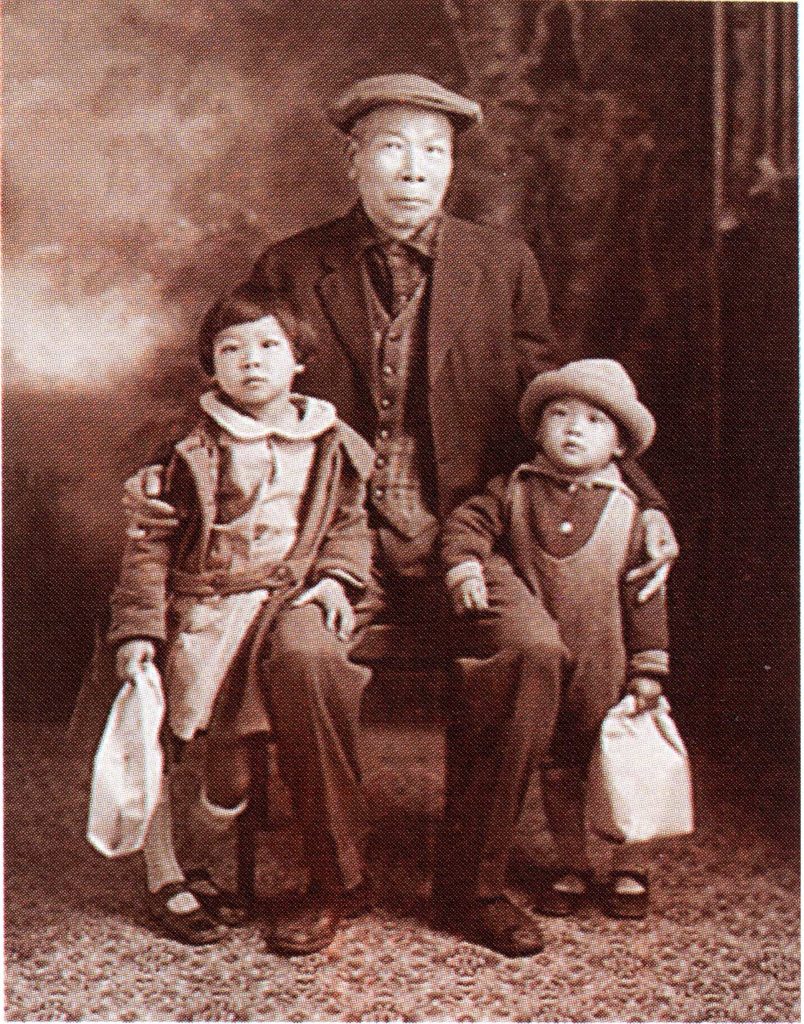
Observing the employment of Chinese laborers in the beet fields and the beginning of the Chinese community in Oxnard, an 1899 article in the Oxnard Courier reassured anxious readers:
To show that the resort to Chinese and Japanese labor is looked upon by the company and others as simply only temporary is the important fact that Oxnard has no Chinatown as is known in other places. No Chinaman owns a foot of Oxnard realty. Two Chinamen have leases to lots upon which they have buildings. Those leases run only for a year.1
Note: Per our note at the start of this article, we have decided to present this quotation as is to prevent diminishing the ugly reality of racism.
Yet even though local residents opposed the establishment of a Chinatown in Oxnard, the Chinese community took hold. The Courier advertised that a building was available for rent in the new Chinatown in 19022. The ethnic enclave was well-established in Oxnard before the city was incorporated in 1903.
Even as the townsfolk and factory management protested the presence of Chinese people in Oxnard, residents of Oxnard’s Chinese community praised the American Beet Sugar Company and its operations. Nora Soo Hoo lived across the street from the factory and her home did not have a yard. She and her family would go to the factory for recreation. Mrs. Soo Hoo spoke fondly of the facility, saying “Everything was so clean. It was so nice when the sun was shining on the factory.”3 As a child, Bill Soo Hoo recalled the hauling of the beets around town:
I can remember the… 20-mule-train-wagon loads of beets being hauled in. They also had rail service. At the same time they had these teams of mules pulling double wagonloads of beets from the fields … we always liked to run out and watch them go by.4
Oxnard’s Chinese community was initially located on Saviers Road (currently Oxnard Boulevard) between 5th and 6th Streets. In 1903, seven Chinese businesses relocated to another site on Saviers Road, between 7th and 8th Streets, bounded by A Street. The proprietors, previously conducting business on rental property, wanted more permanence in the community and so purchased their own land. They had their buildings physically moved to their new land between 7th and 8th Streets and created a new Chinatown.5
The Chinese community was located on one square block of wooden buildings, with an alley running through the center. Local residents named the area “China Alley.” Businesses such as grocers, general mercantile stores, labor contractors, and restaurants provided goods and services to Chinese settlers and the host community of Oxnard. A Chinese Fire Brigade was established around 1900, and the hose cart was housed on the alley. The Bing Kong Tong dedicated a new chapter in Oxnard in 1904.6
By the 1920s, Oxnard’s China Alley consisted of two restaurants, a Chinese saloon, a barbershop, poolroom, grocery stores, and the Chinese Fire Brigade. “Houses of illrepute” were located on A Street. According to local residents, the female tenants of these houses were not Chinese, but due to their presence there Oxnard’s Chinese community became known as a “red light district.” Games of chance were also available in Chinatown, and newspaper accounts detailing arrests at gambling establishments were printed in the Los Angeles Times:
Sherriff Bob Clark led a raid on a Chinese gambling house here last night that resulted in the arrest of seven Chinese and the confiscation of approximately $300 in cash, sixteen gambling tables and a collection of gambling paraphernalia.7
According to Daisy Sem Jue, an early resident in the Chinese community, “Oxnard was known as a Soo Hoo town. Yes, it seemed that every other adult was a Soo Hoo, but we got along very well, everybody was friendly and neighborly.”8 Many of the Chinese men were bachelors or quasi-bachelors. They were married, but their wives remained in China, thus creating a community in Oxnard with few Chinese families.
Soo Hoo Yee Tom, his wife Soo Hoo Jung Hall, and their young daughters Dorothy and Rose, arrived in this bustling Chinese community in the early 1920s. Yee Tom was born in China around 1852, and before coming west, worked as a junk captain on the South China Sea. According to family stories, he sailed to America in his junk and left his wife and family behind in China. It is unclear when he arrived in the United States, but it was probably some time during the last decades of the nineteenth century.
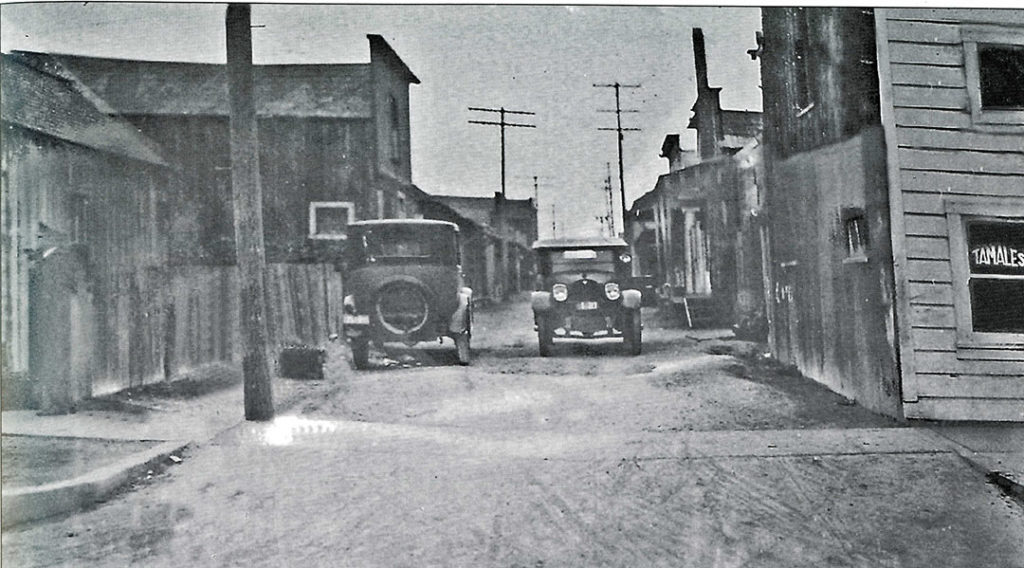
Bill’s mother, Jung Hall, also known as Mama Soo Hoo, was born around 1889 and came to the United States to marry Yee Tom, a man 37 years her senior, in 1909. The couple settled in San Luis Obispo, California, where they had a farm. However, they struggled and lost money for about four years. During World War I, the Soo Hoos finally profited, and after the war they sold their farm and opened a general store in Guadalupe, California.
The family moved to Oxnard and established their small mercantile store in 1920. Their general store was called Wing Chen Lung Company and was located on China Alley9. Although the store sold provisions, Mama Soo Hoo cooked for residents of Chinatown, and her reputation as an exceptional cook grew over time. The store remained in business in Oxnard for seven years, and then the family opened a restaurant on China Alley in an area referred to as the “Old Duck Pond.” Bill Soo Hoo, describing the family business, recalled, “There was a long boardwalk, and many of the old-timers in this area remember that old boardwalk. When we took over the business we changed it [the name] from the Duck Pond to the Oriental Inn.”10 The restaurant remained at that location until it was torn down in 1948.
Irene Soo Hoo was born after the family settled in Oxnard, and Bill was born in 1924, when his father was 72 years old. Being one of the few Chinese boys in Oxnard, Bill garnered a lot of attention from the residents in Chinatown. By 1929, two more boys were born to the Soo Hoo family, Bartley and Edward. As Bartley later remarked of his siblings’ birth order, “We were gentlemen, because we let them come first, ladies first.”11
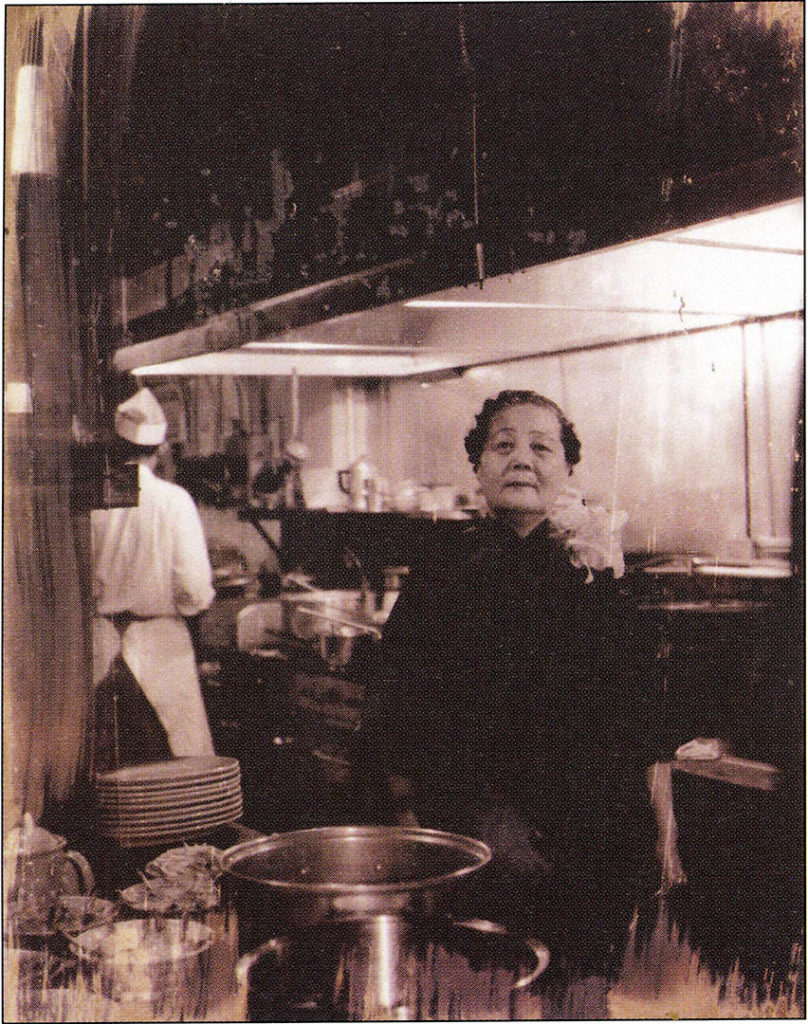
The Soo Hoo children — Dorothy, Rose, Irene, Bill, Bartley and Edward — had a typical American upbringing. They attended local public schools, and played hide and seek, tag, and kick-the-can. They flew kites and played baseball and football. They roller-skated in front of the brothels, and later Bartley recalled one of the madams coming out to admonish the children, yelling, “Keep quiet, my girls are asleep!”12
The family celebrated both Chinese and American holidays. Bartley and Irene Soo Hoo remembered Chinese New Year celebrations. The family would enjoy a big dinner the night before the holiday, and on New Year’s Day there were family gatherings and banquets at the restaurant. Bartley spoke about his mother’s belief that New Year’s Day was to be a day of inactivity. “If anything happened on Chinese New Year it would happen for the rest of the year, so my mother was never open for business on that day,” he recalled. “She believed that if you were going to spend money during that year, why you had to spend it on that day, so she always went shopping on that day.”13
Soo Hoo Yee Tom passed away in 1936, leaving Mama Soo Hoo a widow at 43 years old, left with the family business and six children to support in Chinatown. Irene Soo Hoo Lai later spoke about her mother: “When my father died, [my mother] paid all of his bills. She was not church-going but taught integrity and values, and she taught the Golden Rule.”14
Bill entered the armed forces on January 7, 1943 to serve during World War II. The army sent him to Stanford University to learn Chinese, much to his mother’s delight. He later served in Europe and worked with the occupation army in Germany, and while overseas he earned two battle stars. He returned to Oxnard in 1946 to find three new military bases and a population explosion. The town had grown from 8,000 residents to 13,000 residents while he was overseas.
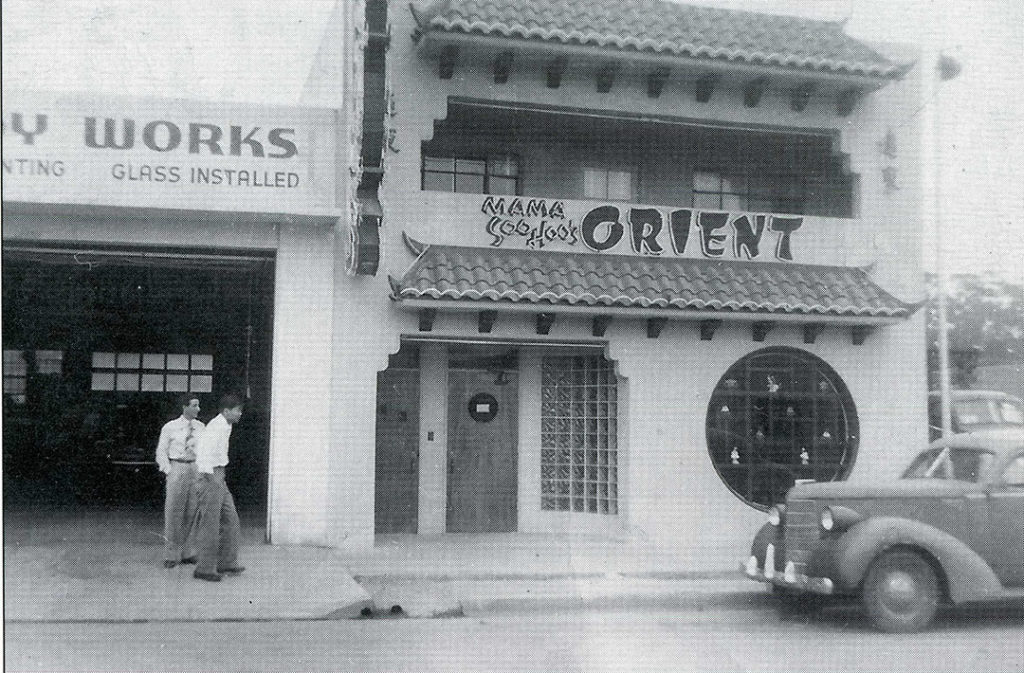
In 1949, the Soo Hoo family opened a new restaurant on Oxnard Boulevard called Mama Soo Hoo’s Orient. The business was located downstairs, the living quarters were upstairs, and the Soo Hoo family lived and worked together. Genny Essa, a family friend, had warm memories of Mama Soo Hoo’s Orient:
Mama Soo Hoo continued to cook when she was in her seventies. … I helped out when Rose or her husband Gene were gone. I would eat with the family, and they ate differently than the food served at the restaurant. They had the traditional Chinese food. I would say to Bill, “You couldn’t get me to eat that Bird’s Nest Soup!” One day they had soup and Bill asked me how I liked the soup, and he told me it was Bird’s Nest Soup. Genny replied, “I thought I saw a feather in there.”15
Mama Soo Hoo conducted both her business and her family with an iron fist, so much so that her children called her “the General.” She was highly regarded in her community and greatly loved by her family, who rewarded her with hard work and dedication. She did not live long enough to see her son elected mayor of Oxnard, passing away October 8, 1965.
Bill’s journey into politics began when he experienced institutionalized racism. Returning from the war, Bill wanted to build a house on a lot available on Deodor Street in Oxnard. Bill purchased the lot, and later recalled:
[The land owner] called me up two days later and he says, “Bill, you can still buy this but I just found out you can’t live there.” I said, “What do you mean I can’t live there?” He said, “There’s a clause in here that says ‘Caucasians only,’ but there’s no law against you buying it, but you can’t live there.” … I said, “What you’re telling me is I’m good enough to go out and fight for my country, and possibly die for my country, but not good enough to live in it.”16
This episode was the catalyst for Bill’s drive to make changes in Oxnard.
Bill began his public life by serving on a Grand Jury in 1956, the first man of Asian heritage to serve in that capacity. Bill then began his political career, aiming for the Oxnard City Council in 1960, running among a field of twelve candidates. He placed third, but only two seats were available. Undeterred, in 1962 Bill ran again for City Council, this time successfully.
In 1966 Bill became “Oxnard’s Native Son Mayor.” With only sixty people of Chinese ancestry in the City, perhaps only ten of whom were registered voters, Bill appealed to the greater population of Oxnard. His election made big news and he was catapulted into worldwide fame. Chinese newspapers in the United States carried news of the election, and Bill made headlines in Canada and Japan. Television and wire services clamored for more information about the new mayor, and Bob Lagomarsino, a state senator, authored a resolution passed by the Senate commemorating Bill’s ascent to the office.
When he was elected mayor, William Du Chun Soo Hoo was forty-two years old and his future in public office was bright. One of his goals was to bring new industries to Oxnard that would promote opportunities for the growing community. As the owner and manager of Mama Soo Hoo’s Orient, Bill’s knowledge of business was an asset to the city. He wanted to work closely with the Division of Highways and improve relations between the cities of Oxnard, Port Hueneme and Camarillo. Looking back at his accomplishments during his tenure as the Mayor of Oxnard, Bill was the most proud of the development that took place in the city, including the building of the inland harbor, additional fire departments and the Cultural Arts Center.
Bill loved politics and aspired to higher public offices. After he fulfilled his term of Mayor of Oxnard in 1970 he ran unsuccessfully as the Democratic candidate against Republican Representative Charles Teague for Teague’s seat in Congress.
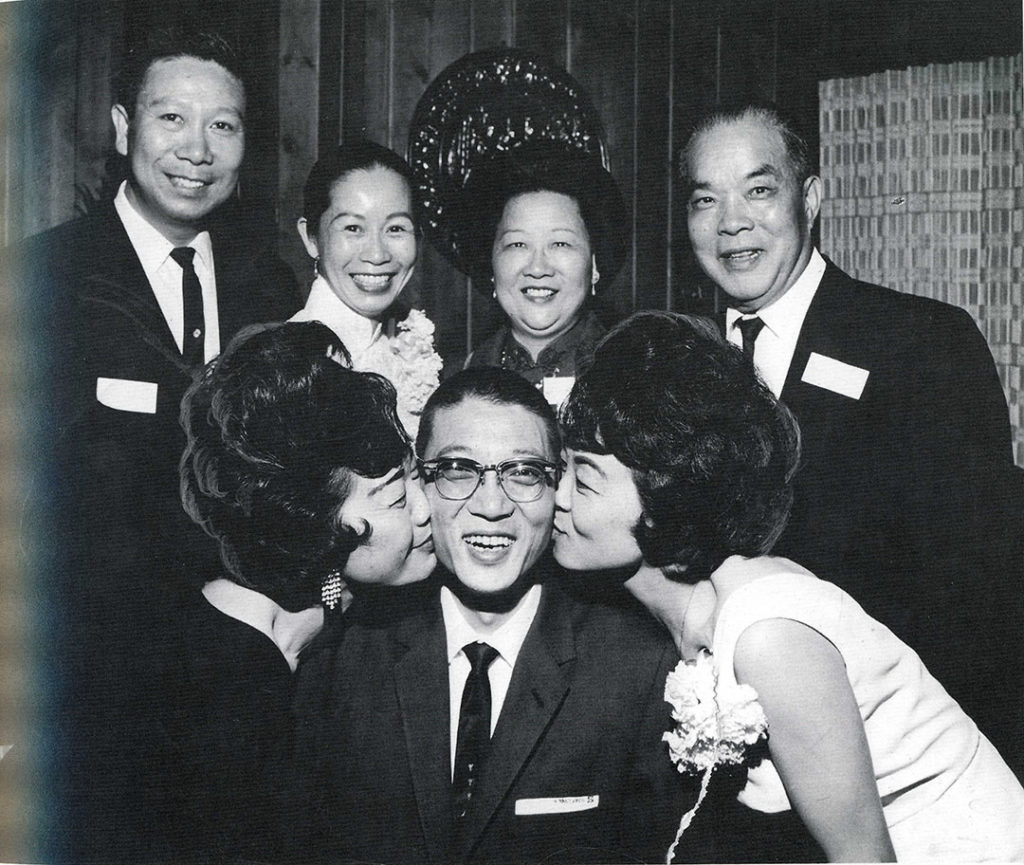
During Bill’s tenure in the mayor’s office he realized that the time had come to get married. He found his match in Angela Lee, of San Francisco, who at the time was working at Stanford University as a researcher. Bill and Angela met at a party in San Francisco, where Angela was asked to turn pages in a book of music while her friend sang. Bill approached Angela and asked her when she was going to sing. She stated that she was only there to help her friend turn pages.
Apparently, Angela made quite an impression on Bill, because he diligently tracked her down and called her a few weeks later. Angela recalled telling him,
Oh, you know, I don’t really remember who you are. But after he explained himself by saying, “I’m the mayor of Oxnard, you know, and I also own my own Chinese restaurant.” Well, owning a Chinese restaurant, I believe. A mayor of Oxnard, I thought, “Yeah and I’m the Queen of Sheba.” [Later I] found out that he really was the mayor. It put another light to the whole thing17.
After a courtship, to the delight of both families, Bill and Angela were married in 1968 at Stanford Chapel. He was forty-five and she was thirty-five. Many people came to the wedding from Oxnard, and Greyhound buses filled with friends and family arrived from San Francisco. After a short honeymoon, the bride and groom returned to Oxnard where Angela was instantly heralded as the First Lady of the City. Their only child, Brian, was born in 1969.
After leaving office Bill heard a visiting official from Washington D.C. say that Port Hueneme needed a customs house brokerage. So, Bill and Angela decided to open Soo Hoo Customs House Brokerage to serve Oxnard Harbor District, and they also opened an office in the Los Angeles Chinatown, where they serve Chinese importers and exporters. Their office was the first Chinese customs house broker in Los Angeles.
Bill Soo Hoo experienced heart troubles beginning in 1973. In October 1990 he suffered a heart attack and died suddenly at age 66, leaving Angela alone to continue the family business. Their son Brian attended the University of Southern California and married Linda Szeto of Thousand Oaks in 1992. Linda and Brian have four children: one son named Brandon and triplet daughters named Ashley, Melody and Neomy. Today Brian and Angela operate Soo Hoo Customs Brokerage together. Angela is active in many organizations, including the Ventura County Chinese American Historical Society, and she travels often. Her grandchildren are the greatest delight of her life.
The story of the Soo Hoo family is one of struggle, determination and success. Yee Tom and Jung Hall Soo Hoo worked hard to establish a business to support their large family. They bore six children, hailing from Chinese parentage, yet Americans through and through. A few of the children married Chinese spouses while others married outside of their ethnicity. The Soo Hoos experienced their share of tragedy, beginning with the death of Yee Tom when the children were young. Sadly, many of the Soo Hoo children died before their time.
Bill skyrocketed in the public arena. When asked about his incredible rise to public office, Bill attributed much of his success to his mother. “What I am today,” he stated, “I owe to my mother and the fine reputation she established in this community.”18 It was Mama Soo Hoo’s philosophy that to be of service to anyone you must be strong in mind, and Bill embodied this conviction. He loved the City of Oxnard and he worked hard to make significant contributions. While the lives of most Chinese pioneers in America are hidden, Bill Soo Hoo’s life and accomplishments are well known and he stands as a symbol of success for his family, his city, and his countrymen.
Today the Chinese Community in Ventura County is strong. In 2003 the United States Census Bureau estimated that 10,391 Chinese residents lived in Ventura County.19 Thousand Oaks has the county’s largest Chinese population, due in part to the tech industry dominant in that city. The county’s Chinese community has come a long way from their origins as hard working merchants, laborers, and cooks who struggled to survive on one city block.
Chinese pioneers are indelibly linked to the history of Ventura County. They helped to build the infrastructure of the emerging county and labored in the nascent agricultural industry. Their lives are intermingled with the host community and they brought character and diversity to frontier towns in Ventura County. Their contributions cannot be denied. After living in Ventura County for over 145 years, the hidden voices of the Chinese in Ventura County are just beginning to be heard.
Footnotes
- Oxnard Courier, 20 May 1899.
- Oxnard Courier, 13 December 1902.
- Interview with Nora Soo Hoo, 20 June 2003.
- Bill and Angela Soo Hoo Oral Interview, recorded October 1982. On file, Research Library, Museum of Ventura County, Ventura, California.
- Oxnard Courier, 7 August 1903
- Los Angeles Times, 5 September 1904.
- Los Angeles Times, 14 July 1929.
- Interview with Daisy Sem Jue.
- Ventura County Directory (Los Angeles : Los Angeles Directory Co. , 1929). On file, Research Library, Museum of Ventura County, Ventura, California.
- Bill and Angela Soo Hoo Interview.
- Interview with Bartley Soo Hoo, recorded 23 August 2003, Oxnard , California.
- Interview with Angela Soo Hoo, recorded 12 January 2002, Oxnard, California.
- Interview with Bartley Soo Hoo.
- Interview with Irene Soo Hoo Lai, recorded 8 May 2003, San Pedro, California.
- Interview with Genevieve Essa, recorded 12 March 2006, Oxnard, California.
- Bill and Angela Soo Hoo Oral Interview.
- 85 Ibid.
- American Community Survey 2003 Data Profile, United States Census Bureau. The population estimate for Chinese residents excludes residents from Taiwan.
